#psychometric evaluation test
Explore tagged Tumblr posts
Text
#psychometric test#psychometric assessment#psychometric evaluation#online psychometric test#psychometric profiling#psychometric assessment test#psychometric assessment tools#psychometric test for employment#psychometric test for hiring#online psychometric assessment#online psychometric test for recruitment#psychometric assessment test online#psychometric evaluation test#psychometric aptitude test#psychometric skills test#psychometric ability test#psychometric analysis test
0 notes
Text
psychometric tests are weird.
i just did a battery of them last night - CAT-Q, ASRS, AQ, RAADS-R, OAQ, Aspie - and apart from how vague they honestly seemed at times, the feeling i generally got while trying to evaluate myself for supposed neurodivergent traits was a general 'so what'?
i function fine as a human being, as an adult. i am struggling to some degree to be at the best that I could be, perhaps, and i want to get there, but it is taking so much effort (hence the inquiry, which honestly is just an inventory of sorts)
society isn't going to change because I barely meet the threshold for some of these tests (apart from scoring relatively low on the OAQ, which measures alexithymia, I'm just above the research cutoff for AQ. my CAT-Q scores were effectively ambivalent).
I've already lived as my weird-ass self and I've had to face people who've been shitty to me. maybe the anecdotes are right, and i get a bit of a free pass if I said I was autistic or if i said i had adhd. but in general the realities of the world has not changed; the realities of the work i do has not changed, and the reality is that neurotypical cishets still dominate the place I live in even as a carve out a comfortable niche for me and my friends.
i was lucky to have a good first ex-boss, to have good bosses. i was told, by a friend at the domestic newspaper, that they were unusually cruel to me, but that was fine; it's been a year anyway and i get to see if i could go back, to try again. i'm lucky to get to try again where i am now, to do things at my own, considerably leisurely pace.
but i want to do more. I wish I could do more. I wish my body could let me do more. I wish society could recognise me for who I am. I wish I could learn kana or hangul or a new programming language and I wish I could be better at some of the things that I am 'good at'. I wish I was more normal so I could try and do these things with ease, yknow? I wish I was a more productive ellis. but I don't know.
gah
4 notes
·
View notes
Text

Book Release: The Reliability of UFO Witness Testimony (With a Chapter by Cláudio Tsuyoshi Suenaga)
V.J. Ballester-Olmos & Richard W. Heiden (Eds.)
For 76 years, casual observers around the world have reported sightings of aerial phenomena unexplainable to them. More elaborate personal experiences have been reported by others whose testimony speak of close interactions with fantastic flying machines that land, from which strange beings descend, and even kidnap the onlookers. In the absence of compelling physical evidence of the reality of these narrations, how should science study immaterial observations and test these claims? The very standard of reputable witness reliability is at stake here.
The Reliability of UFO Witness Testimony is the first major book to comprehensively focus on the discussion and current views on problems and challenges posed by the reliability of UFO testimonies. This is a cross-disciplinary compendium of papers by 60 authors from 14 different countries. They are specialists in social, physical, and biological sciences, including psychology (predominantly) as well as psychiatry, sociology, anthropology, history, philosophy, folklore, religion, journalism, engineering, computing, medicine, education, analysts with experience in the critical study of UFO perceivers, and other professionals. This volume shares thematically convergent ideas about the plausibility of alternate explanations for an alleged close-range UFO phenomenon.
The 57 chapters in this book are divided into seven section headings: Case Studies, Psychological Perspectives, On Witness Testimony, Empirical Research, Anthropological Approach, Metrics and Scaling, and Epistemological Issues. There, the subject matter is analyzed from statistical work to clinical assessment, psychometrics, comparative and evaluation inquiry, and other topic perspectives.
Some extracts from the Foreword, written by Dr. Leonard S. Newman, Professor of Psychology at Syracuse University:
"The contributors to this book include some very smart people. There are all sorts of issues to which they could be devoting their intellectual energy, and all sorts of scholarly and research contributions they could make. They don’t have to write thoughtful and rigorous chapters for a book called The Reliability of UFO Witness Testimony, but this is what they have done. And so, the work continues, as attested to by the papers in this volume. I’m not sure if there exists any collection of papers on any topic that can claim to comprehensively summarize everything that is currently known about it. But this one comes pretty close."
This 711-page book has been released online in the Academia.edu portal, from where it can be downloaded for free:
Simultaneously, UPIAR Publishing House (Turin, Italy) has published two softcover, A4 format print editions, one in black & white, another in full color (ISBN: 9791281441002). The book can be purchased through this link:
Four outstanding academics have provided praise notes to this volume. This is what they said:
Elizabeth Loftus, Ph.D., Distinguished Professor of Psychology at the University of California, Irvine, USA:
"When ordinary citizens claim to have extraterrestrial encounters, such as seeing UFOs or meeting with alien beings, what should we think? Did the alien abduction really happen or was it a hoax? Is someone deliberately lying? Are they false memories? Readers will be enthralled by the fascinating case histories that are presented in The Reliability of UFO Witness Testimony*, a volume where sixty experts examine these issues with depth and insight. These cases teach us a great deal about how humans come to believe they have experienced bizarre events that may have never occurred at all."
Steven Jay Lynn, Ph.D., Distinguished Professor of Psychology, Binghamton University (SUNY), USA:
"This captivating book will appeal to anyone interested in UFOs (and who isn’t?), the vagaries of memory, eyewitness perception and misperception, critical analysis of puzzling phenomena, and evaluating scientific vs. pseudoscientific claims. This volume ranks in the elite category of essential reading for students, scientists, and the seriously curious among us, and therefore has my highest recommendation. Bravo!"
Henry Otgaar, Ph.D., Professor of Legal Psychology, Maastricht University, the Netherlands, and Leuven Catholic University, Belgium:
"Claims of UFO sightings and experiences continue to fascinate us. This book has collected a unique and diverse set of case studies and critical articles on how such experiences unfold and what the authenticity of these claims is. The collection of these different articles is truly groundbreaking and is the first-ever complete assemblage concerning the validity of UFO testimony."
Benjamin E. Zeller, Ph.D., Professor and Chair of Religion, Lake Forest College, Illinois, USA:
"In referring to extraterrestrial contact, Carl Sagan said that extraordinary claims require extraordinary evidence. This fine book seeks to contextualize what such evidence entails. Its contributors analyze UFO sightings and cases both famous and obscure, recent and historical, and quite international in scope. They draw from an impressive range of methodological, academic, and scientific perspectives, and consider such topics as the nature of cognition, memory, types of belief and testimony, psychology, and the rationality of belief. Skeptics, believers, and scholars of ufology will all find this book fascinating!"
For additional information please contact:
UPIAR Publisher: [email protected]
Editor: V.J. Ballester-Olmos, [email protected]

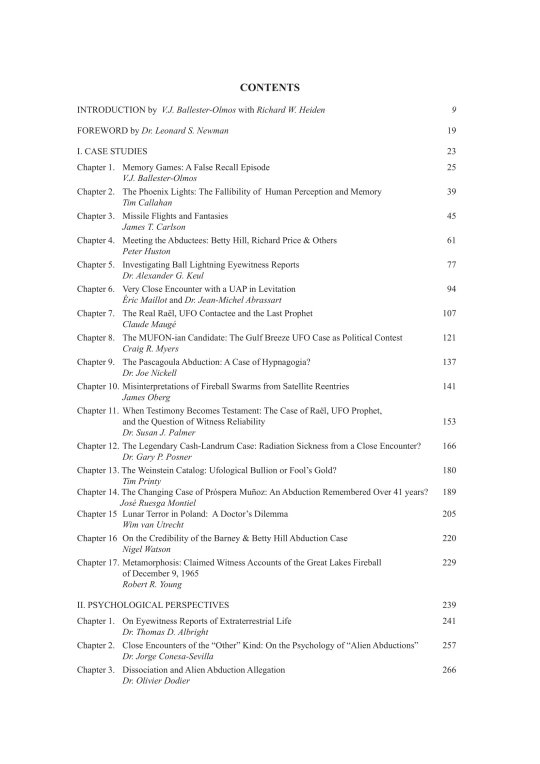
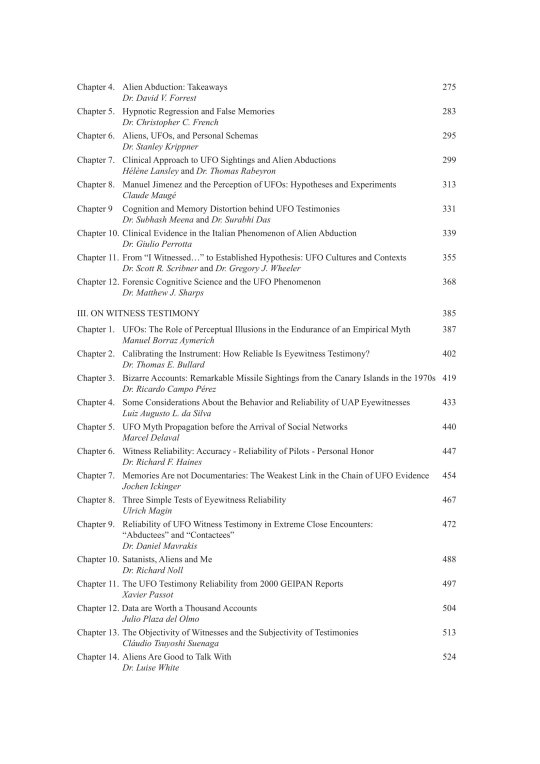
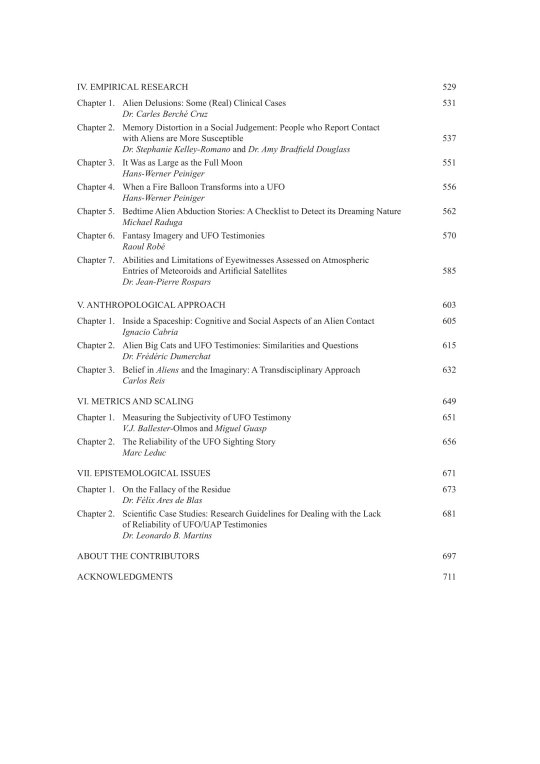
The Objectivity of Witnesses and the Subjectivity of Testemonies
Cláudio Tsuyoshi Suenaga
I had the honor of being one of the select few invited by the distinguished Vicente-Juan Ballester Olmos, one of the organizers and editors of this impressive scientific-academic book, together with the equally distinguished Richard W. Heiden, to write a paper on the "reliability of the testimony of witnesses of UFOs", a crucial aspect of ufological research, since, in the absence of material evidence of the phenomenon, this is the primary source we deal with, the "raw material", so to speak, to permeate our analyses, even more so for those who not only deals with "second-hand" reports, but gathers them directly from the witnesses themselves, in sometimes harsh and hostile field conditions.
In my contribution entitled "The Objectivity of Witnesses and the Subjectivity of Testimonies", I carried out a critical analysis of the general reference base of the UFO problem, the testimony, seen as a cultural source authentic and indisputable, but which presents serious distortions. One of the main points questioned by me was the exact value of the testimonies, which form the basis of the reports and, therefore, of the UFO phenomenon. I tried to give an adequate scientific treatment to these data and factors relegated to the background by ufologists: the subjective observational parameters, the perceptive aspects, the language and the historical-cultural context of the witness and the psychosociological variables, that is, everything that was disparagingly called "background noise", the "sociological reject" despised in detriment of the "signal".

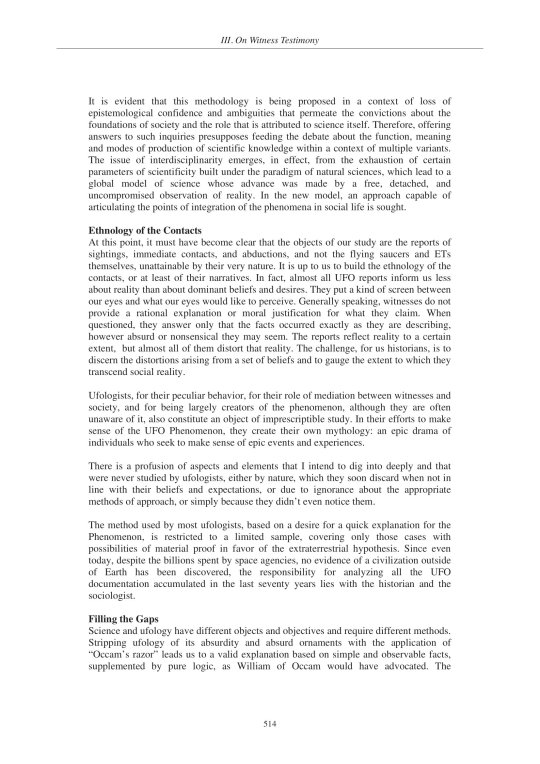
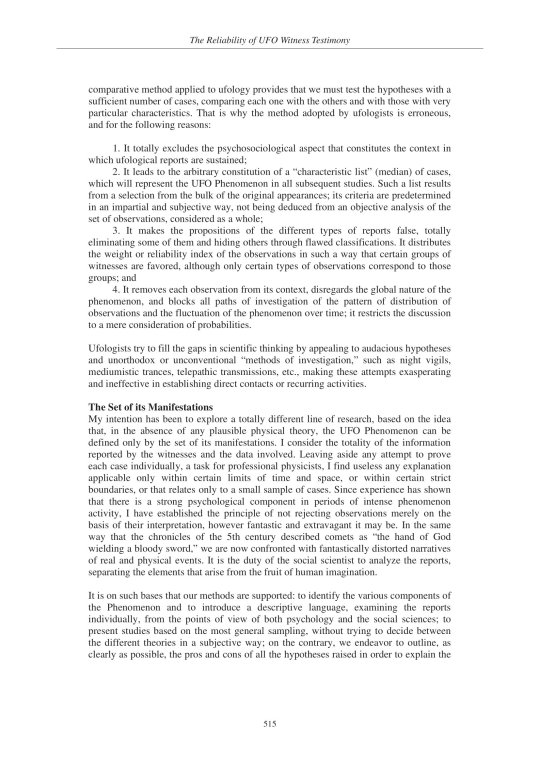
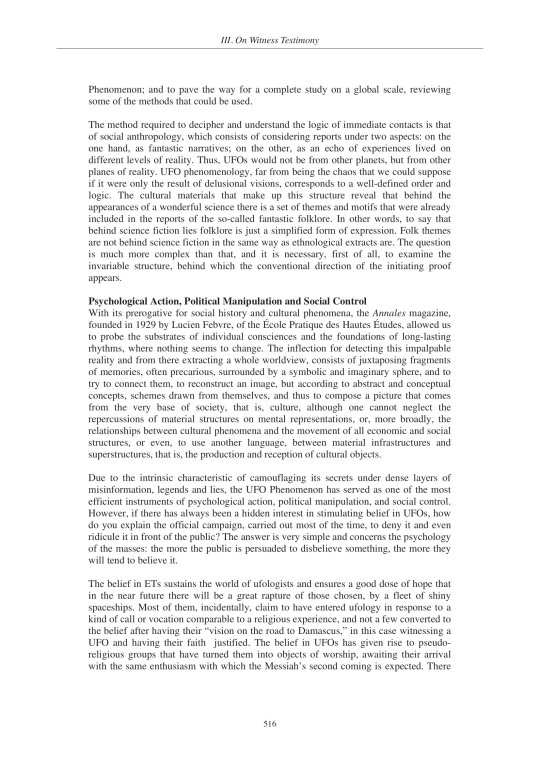
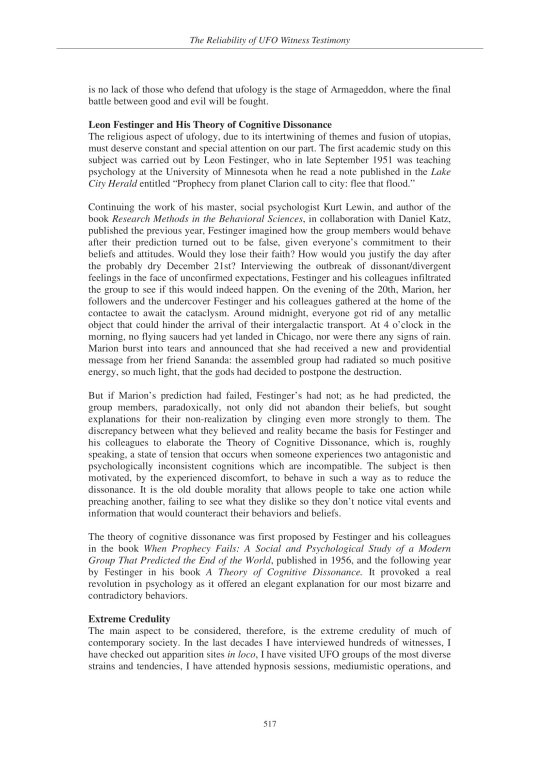
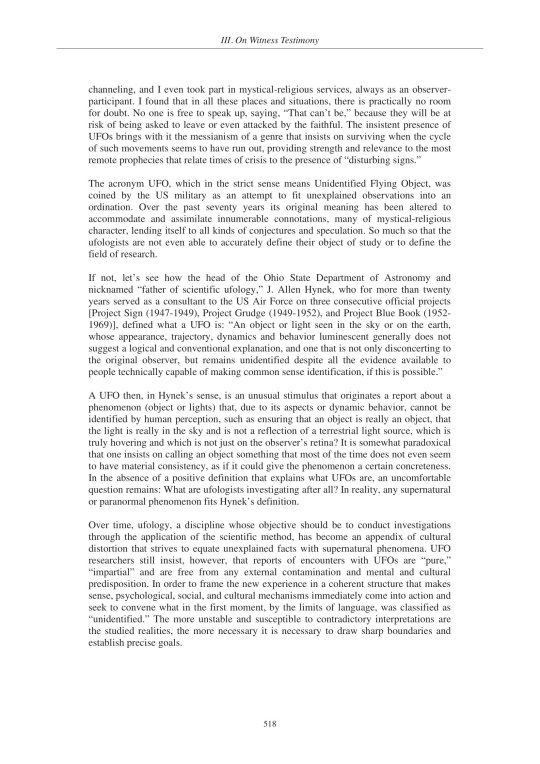
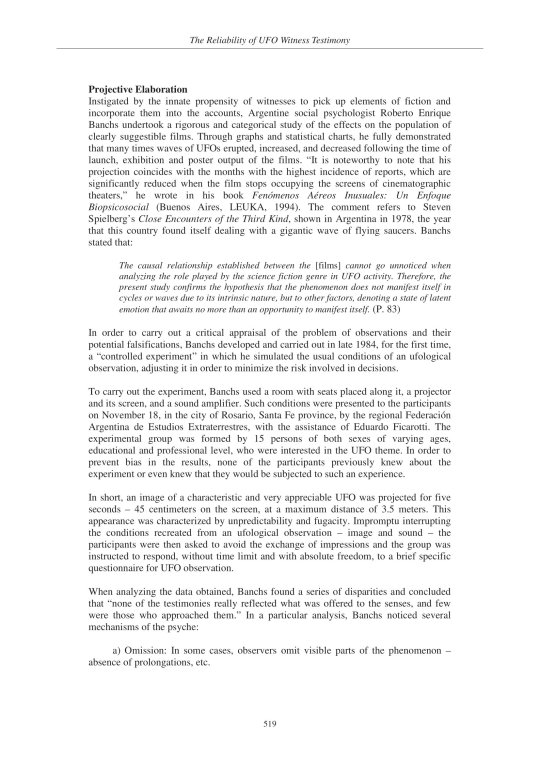
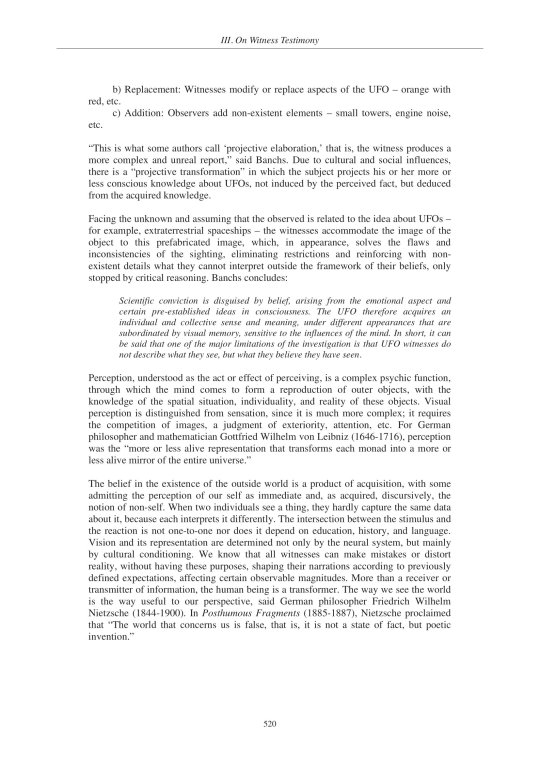
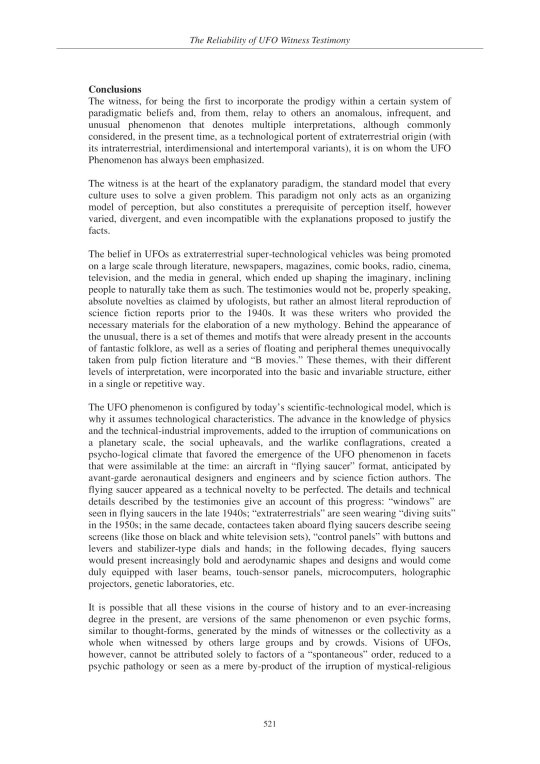

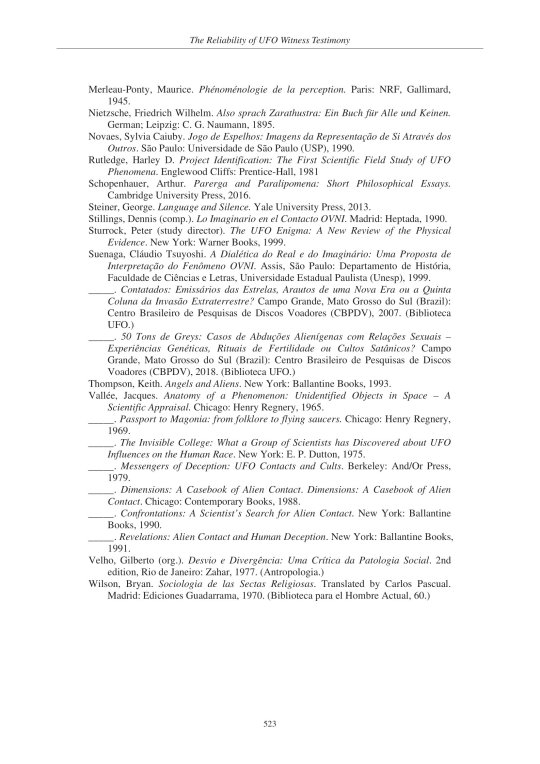
Consult and keep close at hand, therefore, this, the first major book to comprehensively focus on the discussion and current views on problems and challenges posed by the reliability of UFO testimonies. A cross-disciplinary compendium of papers by 60 authors from 14 different countries.
(large format, 711 pages)
You can download the full 711-page book on my Patreon:
#ufologia#ufos#ufo phenomenon#ufo sightings#ovnis#extraterrestres#história#aliens and ufos#antropologia#sociology#historia#psicologia#religião#testemunho#livro#classic academia#books and libraries#science#skepticism#ceticismo#testimony#the witness#suenaga yoroshiku onegaishimasu
29 notes
·
View notes
Text
Let's talk about the MBTI
If you've heard me speak on the subject before, it may not shock you to hear that I'm not a huge fan of the Myers-Briggs Type Indicator, or as it is more commonly known, the MBTI. For those that haven't had the pleasure yet, I find the MBTI to be little better than a horoscope, what descriptive power of one's personality or mental processes are concerned. It's a reoccurring weakness of psychology, frankly, that we seem to struggle so hard with finding any reliable metrics for measuring the human mind, maybe that's a feature and not a bug.
The one factor that the MBTI that I find personally useful, though, is the Introversion/Extroversion dichotomy. I, myself, am pretty introverted as these things go. I need time to decompress after being social, I'm not particularly outgoing as these things go, that whole situation. That said, I don't consider myself antisocial. I love people. I love talking to them, learning from them, figuring out how they tick, or just shooting the breeze and spending some time outside of my own head. I've always scoffed at self-declared "ambiverts" because it appeared as self-evident to me that introversion does not mean being asocial, and that being somewhere on the scale between the two extremes was quite normal.
As I read up on the damn thing, though, it appears I have been too charitable with the MBTI. As it turns out, the MBTI operates on the assumption of a bimodal distribution, which is to say that the majority of test scores would fall close to the two extremes, and not be distributed evenly around the mean as in a Standard Distribution
Where I'm from, there's a satirical observation, or perhaps a very dry joke, stating that "There are two kinds of people. People who own a boat and people who don't." (my translation) This is meant to mock binary sorting systems, as even the untrained "folk psychologist" can plainly see that any such dichotomous categorization of the human animal is plainly ridiculous. And yet, here is the MBTI telling the same joke but four times over and meaning it every time.
Me and my interpretation of local witticisms is, however, not the only one to have picked up on this little inconsistency between the model and what we can observe in reality. A conga line of researchers, see this and this for examples, have looked at the MBTIs assumption of distribution of results and found the dichotomies to be considerably less dichotomous than advertised.
So, without even getting into the other criticisms of the model, let's just say this thing is shaky as fuck from an actual scientific perspective, and the model doesn't have many, if it has any, defenders among the labcoat crowd.
So, why is this important to me at all? Partially because it annoys me on a personal level when junk science circulates in a field I actually know enough about to pick it up, but also because I find it shady as all fuck how this test still lives on in the popular conscience. Part of it is mine and younger generations desperately seeking identity footholds to cling onto in this post(-post?)-post-modern world we flounder around in, but our dearly hated nemesis Late Stage Capitalism also has its share of the blame. You see, while the Tinder profile-havers and Ted:x talk-enjoyers of the world do their part to keep this particular piece of failed psychometrics going, it's a comparatively small push compared to recruiting and business factors.
Businesses love Metrics, and it's easy to see why. In a world where everything is about increasing one number, namely the bottom line, it's immeasurably easier to evaluate the effect of actions and choices if they come with their own tidy little numbers. If spending X dollars on this or that decision ends up increasing the profit by Y%, that's a considerably easier piece of math for evaluating whether doing this was a good idea than if there were no numbers attached and you had to go partially by gut feeling.
Hiring and other personnel decisions are tricky from a business perspective partially because there are considerably fewer good metrics by which to evaluate an actual person than, say, a change in office supplies. Psychometrics is a notoriously tricky field, and although there are some metrics that supposedly covary with productivity or other words the C-suite likes hearing, many of these can be pricy to administer and generally give results with more nuance than fits comfortably in a spreadsheet.
In that context, I can easily see the MBTI standing out as a more attractive option. It doesn't take long to test for and it gives everyone a convenient combination of letters that you can tell yourself means something significant. Granted, it doesn't really tell you anything useful and has terrible test-retest validity, but that's apparently not enough of a deterrent, and if that doesn't tell you a lot about how nuts recruitment has gotten lately don't you worry, I have plenty of other thoughts about the matter.
Those are for another day though. This little rant was originally going to be about introverts and extroverts and how there should be room in a healthy society for both, but then I came across the actual state of the MBTI while making sure I knew what I was talking about, and then that was suddenly all I could write about. Life takes you on some journies at times dear friends, and sometimes you just have to buckle up and ride it out.
9 notes
·
View notes
Text
Autism, a history (mine)
I had multiple neuropsychology evaluations growing up. The second grade one told me there was no sign of autism and the other two didn't even mention it. I talked to the neuropsych testers and therefore couldn't be autistic.
I was an "unruly child" at home but perfect in school. Because I was unruly I was taken to a psychiatrist and given high for an adult doses of mood stabilizers to get to me sit down and shut up. I was unruly (read "manic" by my psychiatrist) because when I was stopped from doing favored activities I would rage and flip from happy bubbly kid to force of pure anger in an instant and as soon as I was given space to calm down or given transition time I was right back to happy and bubbly. As such I spent my entire childhood on lithium, Wellbutrin, and carbatrol and labeled bipolar.
After graduating high school and becoming an adult every adult I met who knew what autism was asked me if I was autistic at some point in my knowing them. Being autistic but undiagnosed, I said no.
When I was 23 I went to my therapist and said I think I'm autistic. He laughed uproariously in my face and said with the utmost paternalism "you're not autistic. Why do you think that?" And I went back in the closet once more.
Cut almost ten years and hundreds of "are you autistic?"s later, I realized I may be autistic. I asked my therapist of several years what they thought and they reminded me of my first visit when they asked "have you ever been diagnosed with autism?"
I paid almost three thousand dollars through the nose for a neuropsychologist to say I was very obviously autistic at our first meeting, before any psychometrics were given, and that she would be glad to do the testing to give due diligence. Funny that...
She told me I am autistic and have ADHD (among other things). No kidding. I was shocked! /s
I truly wonder what my life could have been like with early intervention, were it not for both of my parents likely being autistic and otherwise mentally ill themselves.
#autism#adhd#actually autistic#i don't look in the past for this exact reason. the rage is too strong#this does explain why i made friends most easily with the other“weird” kids in school.#dont worry that psychiatrist lost his medical license for killing several children with over prescribing because he got kickbacks then died.#alls well that ends well...kinda
3 notes
·
View notes
Text
Customer Service Test
Ensure outstanding customer experiences with Psychometric Test Hub's Customer Service Testing solutions. Our tests assess candidates' aptitude for customer service, including communication skills, problem-solving abilities, and empathy. Whether you're evaluating current employees or screening job applicants, our customer service tests provide valuable insights to optimize your customer service strategy. Trust Psychometric Test Hub to help you build a team that consistently exceeds customer expectations and drives business success.

2 notes
·
View notes
Text
I know I don't post a ton of personal stuff on here these days (ah, the joy of having irl friends! Tumblr need no longer be my journal lol) but for some reason I feel compelled to share this, so here you are:
After a couple years of wondering, I decided to really buckle down and do some research--take some psychometric and diagnostic tests, learn about the experiences of those who have been late diagnosed, and do a lot of vulnerable self reflecting--and I've started to accept that I think I may be autistic. (My brother has been telling me this for a while, but I kind of ignored it, because the one time I brought it up to my therapist, she shut it down pretty quickly because I also had trauma. I'm now beginning to wonder if my C-PTSD diagnosis was really just a misdiagnosis...but I did really have trauma, so who knows. Maybe I have both.)
I'm planning on pursuing this further this summer, when I have more time (yay being a teacher!) and can really lean into the process. The area I live in apparently has some really good resources for adult diagnosis and support, which is encouraging. And although I can't shake the lingering fear that I might be wrong and "I'm just weird because I'm messed up," the more research I do the more I feel it might be a real possibility. At least one worth getting formally evaluated.
There are a lot of reasons I think this, which are too personal and numerous to go into here, but yeah--I just wanted to let y'all know. Not entirely sure why, this just feels like the right spot to say it.
And I think Spock would be proud of me. :)
5 notes
·
View notes
Text
Unveiling the Secret Strategies of Top Executive Recruitment Services!
Hiring the right executives is a critical task for any organization, one that directly impacts its growth, culture, and overall success. In today’s competitive business landscape, finding the perfect executive candidates requires a strategic, sophisticated approach that goes far beyond traditional recruitment methods. Top executive recruitment services have developed a series of secret strategies that allow them to identify, engage, and place exceptional leaders who are aligned with a company’s vision and goals. These firms employ advanced techniques to match candidates with roles that suit their skills and character, creating successful placements that support long-term organizational growth. Here’s a look at some of the most effective strategies top executive recruiters use to secure exemplary leadership talent.
Building a Deep Understanding of the Client’s Needs and Culture
One of the most critical steps in executive recruitment is developing a thorough understanding of the client’s specific needs. Successful executive recruitment firms begin by taking time to learn about the company’s values, culture, and long-term objectives. They dive deep into the organization’s history, current position in the market, and the unique challenges it faces. This foundational understanding enables recruiters to identify candidates who not only possess the necessary skills and experience but who also align well with the company’s culture.
In this discovery phase, executive recruiters often engage with board members, C-suite leaders, and other stakeholders to gather insights into what makes an ideal executive candidate for the organization. They explore questions such as what leadership style is most effective within the company, how decisions are made, and what specific personality traits contribute to success. By understanding these nuances, top recruiters can create a profile that reflects the core qualities needed in a new executive, setting the stage for a successful search.
Utilizing an Extensive Network to Reach Passive Candidates
Over many years, top executive recruitment services have cultivated extensive networks of industry professionals. These networks include not only active job seekers but also passive candidates—highly qualified professionals who are not actively searching for new positions but may be open to the right opportunity. Passive candidates are often the best fit for executive roles, as they are usually successful in their current positions, stable, and have a strong track record of leadership.
Reaching passive candidates requires a strategic approach, and executive recruiters are skilled at identifying and discreetly engaging these individuals. They reach out through professional connections, industry events, and personal relationships, presenting each candidate with an attractive, well-researched opportunity that aligns with their career goals. This approach opens up access to top talent who might otherwise be unavailable, expanding the pool of potential candidates far beyond what traditional job boards or listings could provide.
Implementing Advanced Candidate Assessments
Selecting executives based on resumes alone is insufficient, as leadership roles require complex skills, emotional intelligence, and cultural fit. Top executive recruitment services use sophisticated assessment techniques to evaluate candidates holistically. These methods may include in-depth behavioral interviews, psychometric testing, and situational judgment assessments, each of which offers insights into a candidate’s leadership potential, problem-solving skills, and interpersonal abilities.
Behavioral interviews are a standard assessment method where recruiters ask candidates to discuss real-life examples of how they handled specific challenges, made decisions, and led teams. These interviews reveal how candidates react under pressure, approach conflict resolution, and demonstrate strategic thinking. Psychometric tests, on the other hand, provide a snapshot of a candidate’s personality traits, such as resilience, adaptability, and communication style, which are all crucial for leadership success. By combining these assessments, executive recruiters gain a more complete understanding of each candidate’s abilities and potential to thrive within the organization.
Ensuring Cultural Fit for Long-Term Success
Cultural fit is an essential component of executive success, as executives who align with a company’s values, mission, and work environment are more likely to thrive and inspire their teams. Executive recruitment services place a strong emphasis on assessing cultural alignment, as even the most skilled candidate may struggle if their values or leadership style do not resonate with the organization’s culture.
Top recruiters prioritize cultural fit by first gaining a clear understanding of the company’s values and working environment. They then ask targeted questions to explore the candidate’s values, work preferences, and ideal organizational climate. For example, if a company has a collaborative, consensus-driven culture, recruiters look for executives who have a track record of fostering teamwork and open communication. By focusing on cultural alignment, executive recruitment services increase the chances of a long-lasting, successful hire that supports the company’s overall mission and vision.
Using Discretion and Confidentiality Throughout the Process
Executive recruitment often requires a high degree of confidentiality. Companies may need to keep their search private to protect their current leaders, avoid impacting stock prices, or maintain a competitive advantage. Likewise, candidates for executive roles often require discretion, as they may be evident within their current organizations.
Top executive recruiters understand the importance of confidentiality and have well-established protocols to protect sensitive information. They handle all communications with care, only revealing company names and job specifics to candidates who have been thoroughly vetted and who show serious interest in the opportunity. This level of confidentiality builds trust with both the client company and the candidate, making it easier to foster honest discussions and manage expectations.
Managing a Streamlined, Efficient Process
The timeline for hiring executives can be lengthy, sometimes taking several months from start to finish. Top executive recruitment firms are skilled at managing this timeline efficiently to prevent delays while ensuring thoroughness at each stage. They coordinate communication, schedule interviews, and manage candidate follow-ups to keep the process on track, reducing time to hire without sacrificing quality.
By taking on the logistics of the hiring process, executive recruiters allow internal teams to focus on their core responsibilities. This efficiency minimizes disruption within the organization, ensuring that crucial leadership roles are filled in a timely manner. The streamlined approach to executive hiring also allows companies to maintain momentum and continuity, which is especially important when hiring for roles with a significant impact on business operations.
Employing Market Knowledge to Enhance the Hiring Process
Top executive recruitment services stay current on industry trends, salary benchmarks, and evolving expectations for leadership roles. This market knowledge enables them to provide valuable guidance to their clients, advising on competitive compensation packages, required skills, and strategic priorities. They can help companies set realistic expectations for the candidate pool, salary, and benefits, ensuring that the offer is both attractive to candidates and aligned with market standards.
By keeping a pulse on industry changes, executive recruiters are able to offer proactive advice that enhances the hiring process. For example, they may suggest candidates with emerging skills that align with future business needs or help clients understand the benefits of hiring for diversity and inclusion. This forward-thinking approach positions the company for growth, as it ensures that each executive hire is made with the company’s long-term success in mind.
Negotiating Offers and Facilitating Onboarding
Once the right candidate is identified, the recruitment service continues to add value by facilitating the offer negotiation and onboarding processes. Executive-level hires often involve complex compensation packages, including base salary, bonuses, equity, and other benefits. Recruitment firms have the expertise to navigate these discussions diplomatically, ensuring that both parties’ expectations are met.
After the offer is accepted, executive recruitment firms often assist with onboarding, helping the new executive acclimate to the company’s culture, meet key stakeholders, and understand their role within the leadership team. By providing support throughout the transition, top executive recruiters set the stage for the executive’s success, creating a smooth start that helps the executive contribute meaningfully to the company from day one.
Building Long-Term Relationships with Clients
Top executive recruitment firms understand the importance of long-term partnerships with their clients. They view themselves not as one-time service providers but as ongoing partners in the company’s growth journey. Through these relationships, they gain a deep understanding of the company’s evolving needs, goals, and culture, which allows them to anticipate future hiring needs and provide proactive support.
These long-term partnerships benefit both the recruitment firm and the client, as they ensure consistency in the hiring process and foster trust. Many executive recruiters offer additional services, such as succession planning, leadership assessments, and talent management consulting, which help companies build a strong pipeline of future leaders. By working with an executive recruitment service over time, companies gain a reliable partner that contributes to their ongoing growth and development.
Top executive recruitment services employ a range of secret strategies that enable them to attract, assess, and place high-caliber leaders who are well-suited to drive organizational success. From their thorough understanding of the client’s needs and culture to their use of advanced assessment techniques, confidentiality, and market expertise, these firms bring a level of sophistication and efficiency to the executive hiring process that goes beyond traditional recruitment methods.
For companies seeking to make impactful executive hires, partnering with an experienced recruitment service is a strategic choice that offers numerous advantages. By leveraging the recruiter’s networks, assessment tools, and knowledge of industry trends, organizations can ensure that they attract leaders who are aligned with their values and equipped to lead with vision. As companies face an increasingly complex and competitive market, the guidance and support of a top executive recruitment service are invaluable assets in building a resilient, capable leadership team poised for long-term success.
0 notes
Text
How Executive Recruitment Services Can Help You Find Top Talent
In today's dynamic business world, attracting and retaining the right leaders is crucial to organizational success. Top talent brings experience, vision, and strategic insight that can drive growth, foster innovation, and cultivate a positive workplace culture. However, finding these high-caliber leaders is a complex process that requires more than just traditional recruitment methods. Executive recruitment services have become an invaluable resource for companies looking to secure the best candidates for critical roles.
These specialized firms bring industry expertise, extensive networks, and tailored recruitment strategies that allow businesses to identify and attract top talent effectively. In this article, we will explore how executive recruitment services can help organizations secure the best candidates, ensuring a leadership team that drives long-term success.
Access to an Expansive Network of Qualified Candidates
One of the primary advantages of partnering with executive recruitment services is their access to an extensive and diverse network of qualified professionals. Unlike traditional recruitment methods, which may be limited to active job seekers, executive recruiters have connections with a wide range of candidates, including passive candidates who are not actively looking for new opportunities but may be open to the proper role. By reaching out to this untapped talent pool, executive recruiters can present companies with highly qualified candidates they would not otherwise have encountered.
Executive recruitment firms spend years building relationships with top industry talent, which enables them to connect with individuals who possess specialized skills, leadership qualities, and a track record of success. By tapping into these established networks, companies gain access to professionals who bring the specific expertise and experience needed to meet their unique requirements. This expanded reach makes it possible for organizations to consider candidates with varied backgrounds, increasing the likelihood of finding an exceptional leader.
Expertise in Identifying High-Potential Candidates
Identifying top talent goes beyond evaluating resumes and matching job descriptions. Executive recruitment services bring specialized knowledge and experience in identifying high-potential candidates with the skills, qualities, and personality traits necessary for success in leadership roles. By using a combination of in-depth interviews, assessments, and behavioral evaluations, executive recruiters can assess each candidate's strengths, weaknesses, and potential for long-term success within the organization.
Recruitment firms employ various tools, such as psychometric testing and competency-based interviews, to evaluate candidates' leadership styles, emotional intelligence, and problem-solving abilities. This thorough assessment process enables recruiters to present companies with candidates who are not only qualified but also well-suited to the role's specific demands. This focus on identifying high-potential individuals ensures that companies are selecting leaders who can make a positive impact and adapt to future challenges.
Streamlining the Hiring Process for Increased Efficiency
The hiring process for executive positions is often time-intensive and complex, involving multiple stages of candidate sourcing, evaluation, and negotiation. For companies managing this process internally, it can be challenging to balance these responsibilities with other essential business operations. Executive recruitment services streamline this process by handling every aspect of candidate identification and screening, reducing the time and effort required from internal teams.
Recruiters manage all stages of the process, from sourcing and initial outreach to coordinating interviews and conducting reference checks. With access to pre-screened, highly qualified candidates, recruitment firms can expedite the hiring process, ensuring that companies fill executive roles more quickly and effectively. This efficiency is particularly valuable for organizations facing urgent needs, as it minimizes disruptions to operations and ensures that key leadership positions are filled without delay. By reducing the burden on internal teams, executive recruitment services enable companies to focus on their core responsibilities while ensuring a smooth and efficient hiring process.
Enhancing Objectivity and Reducing Bias in Hiring
Hiring for executive roles requires a high degree of objectivity, as leadership candidates must be evaluated not only on their qualifications but also on their fit within the company's culture and vision. When handled solely by internal teams, the hiring process may be influenced by internal biases or preferences, which can impact the quality of hiring decisions. Executive recruitment services bring an impartial perspective to the process, ensuring that candidates are evaluated based on their skills, experience, and alignment with the company's goals.
Recruitment firms use structured assessments, data-driven insights, and standardized interview techniques to provide an unbiased evaluation of each candidate. By focusing on objective criteria, executive recruiters help companies avoid the pitfalls of subjective decision-making, enabling them to select leaders who are genuinely best suited for the role. This level of objectivity promotes fair and transparent hiring practices, allowing companies to build leadership teams based on merit and capability rather than personal preferences or office politics.
Promoting Cultural Alignment for Long-Term Success
Cultural alignment is a critical factor in successful executive hiring. Leaders who share the company's values and understand its mission are more likely to connect with teams, inspire employees, and contribute to a positive organizational culture. Executive recruitment services prioritize cultural fit in their selection process, ensuring that candidates not only meet professional qualifications but also align with the company's vision and working environment.
Recruiters conduct in-depth interviews to assess candidates' values, communication styles, and approaches to leadership, enabling them to identify individuals who will thrive within the organization's unique culture. This emphasis on cultural alignment enhances the likelihood of a successful placement and reduces the risk of turnover. Leaders who resonate with the company's core values are more likely to contribute positively to team morale, productivity, and overall performance, creating a cohesive and motivated leadership team.
Reducing the Risk and Costs of a Mis-Hire
A poor hiring decision at the executive level can have significant financial, operational, and reputational consequences. The cost of a mis-hire is often much higher for leadership roles than for lower-level positions, as executives influence the direction and success of the entire organization. Executive recruitment services mitigate this risk by employing a rigorous selection process that ensures only the most qualified and well-suited candidates are presented for consideration.
Through comprehensive vetting, background checks, and assessments, recruiters thoroughly evaluate each candidate's qualifications, career history, and potential to excel in the role. By conducting this due diligence, executive recruitment services minimize the risk of hiring a candidate who may not meet the company's needs, saving the organization from the potential costs associated with rehiring and retraining. This level of scrutiny ensures that companies bring on leaders who are capable, committed, and prepared to drive positive change.
Supporting Diversity and Inclusion in Leadership
Diversity and inclusion have become essential considerations for organizations seeking to remain innovative, resilient, and connected to a global customer base. Diverse leadership teams bring a range of perspectives and experiences, which contribute to more comprehensive decision-making and increased adaptability to change. Executive recruitment services play a vital role in promoting diversity by sourcing candidates from varied backgrounds and providing access to a broader talent pool.
Many recruitment firms prioritize diversity as part of their recruitment strategy, actively seeking candidates who represent different demographics, industries, and experiences. By promoting inclusivity in leadership, executive recruiters help companies create teams that reflect a wide range of viewpoints, which enhances creativity, adaptability, and market relevance. This focus on diversity and inclusion strengthens a company's ability to respond to evolving market needs and fosters a culture of openness and respect that supports long-term success.
Providing Flexibility and Adaptability to Changing Needs
The business world is constantly evolving, and companies must be able to adapt quickly to changes in market conditions, industry trends, and customer demands. Executive recruitment services offer flexibility that allows companies to respond effectively to these changes by identifying leaders with the specific skills and experience needed to navigate new challenges. For example, as digital transformation and sustainability become increasingly important across industries, companies may require leaders who excel in these areas. Recruitment firms have the expertise to locate candidates with the relevant skills, enabling companies to build a leadership team that can adapt to changing market needs.
Additionally, executive recruitment services offer companies the option to engage in project-based or interim placements, providing temporary leadership solutions for specific projects or transitions. This flexibility is invaluable for companies facing unexpected changes, such as rapid growth, mergers, or restructuring, as it allows them to secure experienced leadership on short notice. By offering adaptable solutions, recruitment services help companies remain agile and responsive, empowering them to capitalize on new opportunities and maintain a competitive edge.
Enhancing Brand Reputation and Attracting Top Talent
A company's reputation is closely tied to the quality of its leadership. Strong, competent, and ethical leaders enhance a company's brand image, build trust with stakeholders, and positively influence employee morale. By investing in executive recruitment services, companies can ensure they are bringing on leaders who reflect their values and brand identity. This alignment between leadership and brand values reinforces the company's public image and enhances its appeal to customers, investors, and prospective employees alike.
In addition, companies that demonstrate a commitment to high-quality hiring practices send a positive message to the market, indicating that they prioritize excellence and are prepared for future growth. This reputation attracts top talent, strengthens relationships with investors, and boosts customer confidence, all of which contribute to the company's long-term success. Executive recruitment services play a crucial role in shaping this positive brand image by securing leaders who uphold the company's standards and values.
Supporting a Smooth Transition and Successful Onboarding
Hiring an executive is just the beginning; ensuring that they transition smoothly into their new role is equally vital for long-term success. Executive recruitment services provide valuable support during the onboarding process, offering resources and guidance to facilitate a successful transition. Many recruitment firms work closely with both the company and the new executive to develop an onboarding plan that includes introductions to key stakeholders, alignment with company goals, and an overview of organizational culture and values.
This support helps new executives settle into their roles more quickly, enabling them to start contributing to the company's goals without delay. By facilitating a smooth transition, recruitment services not only enhance the executive's ability to adapt but also improve their chances of achieving long-term success within the organization. This comprehensive approach to onboarding supports a positive start for new leaders. It minimizes the challenges that can arise when executives are left to navigate their new environment without sufficient guidance.
The Value of Executive Recruitment Services in Finding Top Talent
In today's competitive and fast-paced business environment, securing exemplary leadership is essential for sustained success. Executive recruitment services simplify and enhance the hiring process, providing companies with access to a broader talent pool, expert evaluation techniques, and comprehensive support that ensures new leaders are well-matched to the organization's goals and culture. By reducing the time to hire, enhancing objectivity, promoting diversity, and minimizing the risk of misfiring, recruitment firms enable companies to make better hiring decisions that support long-term success.
Investing in executive recruitment services is more than a solution for filling immediate vacancies; it's a strategy for building a leadership team that is capable, adaptable, and aligned with the company's vision. By streamlining the hiring process and providing valuable insights, executive recruitment services help companies secure the leaders they need to thrive in a constantly evolving market. The benefits extend beyond immediate hiring needs, laying a foundation for sustained growth, innovation, and resilience in an increasingly competitive landscape.
0 notes
Text
Eliminate Hiring Biases with Technology-Led Assessments

Do you know 60% of interviewers make their decisions within the first 15 minutes which may result in inconsistent hiring? Interviewers make rapid decisions due to various biases and inefficient hiring processes. It leads to the selection of candidates based on initial impressions rather than a comprehensive evaluation.
In this competitive world of recruitment, biases can restrict you from hiring top talent and excelling in your business. These biases are often triggered unintentionally because of the surroundings, experiences, and upbringings. Technology-led and data driven assessments eliminate these biases efficiently from the hiring process.
Understanding Common Hiring Biases
Before diving into how technology-led assessments can remove hiring biases, it’s important to understand the types of biases that commonly affect the hiring process.
Confirmation Bias
This bias is about subconsciously seeking out information that confirms pre-existing beliefs about a candidate. Recruiters tend to ask questions that confirm their expectations or interpret dis-satisfying answers in a way that aligns with their initial impression of the candidate.
Halo Effect Bias
Halo effect bias is about getting influenced by one positive trait and making a perception about a candidate. This impacts the quality of hire, overshadows other qualities as well as incompetencies, and leads to wrong hiring decisions.
Similarity Attraction Bias
Sometimes recruiters favour candidates with similar backgrounds (same native place/caste/community) and interests. This is another kind of bias that diverts recruiters from hiring a diversified and skilled workforce. Recruiters unintentionally get impacted by these biases which lead to unfair hiring decisions.
The Role of Technology-Led Assessments
The new-age assessments can efficiently remove biases and fuel the hiring process. These assessments leverage advanced technologies such as artificial intelligence (AI), machine learning (ML), and data analytics to provide accurate assessments for the candidates.
Objective Data-Driven Assessments
Tech-led assessments can easily navigate the biases in modern-day hiring. These assessments are data and algorithms driven to evaluate candidates based on the requirements. It minimises any influence and stays focused on competencies. For instance, psychometric tests, cognitive ability tests, and skill-based assessments provide quantifiable data on a candidate's abilities and potential.
Standardised Evaluation Procedures
Automated and standardised evaluation can drastically remove biases. These assessments evaluate candidates in real time which removes the chances of influenced hiring.
Blind Screening Processes
Advanced assessments maintain the anonymity of candidates. With these assessments, the candidate’s personal details are not visible which reduces the chances of the recruiter getting influenced. The blind approach biases are related to gender, ethnicity, age, and other personal attributes.
Predictive Analytics and Machine Learning
Cutting-edge assessments leverage machine learning and predictive analytics to analyze data of past candidates to predict job performance. Recruiters can make informed decisions about candidates by assessing relevant competencies and traits for specific roles. These make it easy for recruiters to maintain fairness.
Advantages of Technology-Led Assessments
Enhancing Fairness and Diversity
Technology-led assessments are scientifically proven to mitigate impartial hiring. These are efficient for evaluating candidates based on their potential. Also, these help you broaden your hiring capabilities and recruit a diverse workforce. This diversity can drive innovation and performance, contributing to the organisation's success.
Improving Quality of Hire
The quality of your hiring determines your workforce quality. Assessments play a n important role in the entire hiring process. Objective assessment can change the way you can leverage your workforce. These advanced assessments help candidates unleash their potential so that recruiters can fairly hire the best-fit candidates.
Streamlining the Hiring Process
Technology-led assessments can eliminate the trials and tribulations typical to a lengthy hiring process. From automated workflows to evaluation in real-time, AI-backed assessments can significantly improve your recruitment process and reduce the overall time otherwise invested in hiring.
Enhancing Candidate Experience
Candidates appreciate a fair and transparent hiring process. Technology-driven assessments provide a clear and objective evaluation that strengthens the brand image and attracts top talent.
Looking for a way to remove hiring bias?
Arbitrary assumptions of recruiters can take a toll on a company’s image and success. In the era where fairness is the key to successfully hiring top talent, organizations can leverage technology-led assessments. Prevent mis-judgments and build a workforce that fits like a missing part of a puzzle in your organization. At MeritTrac, we provide intelligent and advanced assessments to ensure a fair, accurate evaluation of candidates.
Take a step forward to revolutionize talent acquisition with data-backed, scientific assessment and hire a more diverse, innovative, and high-performing workforce.
Drop an email [email protected] to schedule a demo.
0 notes
Text
Career Counsellors in Delhi: Navigating Your Path to Success

Choosing the appropriate professional path can be one of the most important decisions in life. In a lively city like Delhi, where chances abound, having a reliable career counselor on your side can be life-changing. Career counsellors provide professional advise to students, professionals, and career changers by analyzing their talents, strengths, and aspirations and matching them to appropriate career routes. Anubha Verma (Counselling Psychologist) specializes in tailored career counseling, enabling people to make educated decisions and develop successful professions.
Why Career Counselling Matters in Today’s World
With so many professional options available, deciding on a particular career might be tough. Today’s professional landscape is vast and ever-changing, spanning from traditional professions like medicine and engineering to creative industries like graphic design and filmmaking. Family expectations, cultural influences, and personal goals all contribute to the complexity of job decisions. employment counseling provides individuals with the insight and assistance they require to align their abilities and goals with employment options that offer both fulfillment and progress.
Career counsellors are not just mentors; they are trained professionals who use psychometric tests, career assessments, and one-on-one sessions to guide individuals. This process ensures a well-rounded understanding of the person’s personality, aptitudes, and long-term career goals. At Anubha Verma (Counselling Psychologist), we offer an approach that’s empathetic and grounded in our commitment to help you succeed.
Services Provided by Career Counsellors in Delhi
Career Assessment and Aptitude Testing The assessment of an individual’s talents, interests, and abilities is an essential component of career counseling. Career counsellors assist students and professionals in determining which careers best match their natural inclinations by administering aptitude tests, personality assessments, and skill evaluations.
Guidance on Career Options job counsellors present a variety of job possibilities based on the assessment results. Anubha Verma (Counselling Psychologist), for example, goes beyond standard options to study emerging sectors such as digital marketing, data science, and UX design, providing a personalized strategy for each client.
Educational Path Guidance Career counsellors advise students and professionals wishing to enhance their education on the finest courses, universities, and training programs. Counsellors assist clients in choosing a path that would result in the best professional outcomes by taking into account aspects such as course duration, return on investment, and industry demand.
Interview Preparation and Job Search Strategies The journey does not end with selecting a career choice. Many people experience problems during the job search process, such as creating resumes, preparing for interviews, and learning how to network effectively. Our career counseling program offers instruction in job search tactics, interview preparation, and soft skills, all of which are necessary in today’s competitive employment market.
Career Change Guidance Career advice is not only for students and new grads. When it comes to changing careers, many professionals seek career guidance. Individuals in Delhi can make a smooth transition into new fields by working with our counsellors, who will provide them with the necessary skills and insights.
The Benefits of Career Counselling with Anubha Verma
Personalized Guidance At Anubha Verma (Counselling Psychologist), we think that each client is distinct. Our career counseling sessions are customized to each individual’s unique needs, aspirations, and values. We provide one-on-one counseling that is tailored to each client’s unique pace and preferences.
Experienced and Qualified Counsellors With years of experience and a thorough understanding of many industries, our staff provides dependable and current information. Our counsellors continuously update their knowledge to ensure that they can advise on both traditional and modern job alternatives.
Practical, Hands-On Support Anubha Verma (Counselling Psychologist) provides career counseling that goes beyond chats and assessments. We help customers take tangible measures, such as career planning, application tactics, and networking advice, so that they can confidently enter their desired careers.
Long-Term Success Unlike other services that may focus solely on immediate results, we prioritize the long-term career success of our clients. Our mission is to ensure that clients not only secure fulfilling jobs but also enjoy long, rewarding careers.
The Importance of Choosing the Right Career Counsellor
Delhi is home to many career counsellors, but finding a professional who understands your unique needs can make all the difference. The right counselor takes the time to listen, assess, and offer solutions that fit your life goals and circumstances. At Anubha Verma (Counselling Psychologist), we combine empathy, expertise, and a holistic approach to help each individual make informed, confident career decisions.
Get Started on Your Career Journey Today!
If you’re in Delhi and want to make an informed career choice, we can assist. With our devoted staff at Anubha Verma (Counselling Psychologist), you will receive personalized counsel that will provide you clarity and confidence in your career path. Contact us today to take the first step toward a prosperous and fulfilling career.
Contact Information
Phone: +91–9818412314
Email: [email protected]
Address: Odeon Plaza, Mall Rd, Sec-6 Market, Sector 4, Dwarka, New Delhi, Delhi, 110075
Take charge of your career with the support and expertise you deserve. Let Anubha Verma (Counselling Psychologist) be your trusted guide on the path to success.
#CareerCounselDelhi#DelhiCareerGuidance#CareerAdviceDelhi#CareerCounsellorDelhi#DelhiCareerCoaching#career counseling counselor anubha verma#counselor anubha verma#best psychologist in delhi#counseling psychologist in delhi#career counselor in delhi
1 note
·
View note
Text
What to Look for When Choosing an Executive Search Firm for Your Company
When your company needs to fill senior leadership roles, partnering with the right executive search firm is critical. Executive search firms specialize in recruiting top-level executives like CEOs, CFOs, and other senior leaders. The right firm can ensure a successful hiring process by finding the best fit for your company’s goals, culture, and long-term growth. Here’s what to look for when choosing an executive search firm.
1. Industry Expertise
One of the key factors in choosing an executive search firm is their level of expertise in your specific industry. Firms with deep industry knowledge have access to specialized networks and know how to identify and attract the right leadership talent. Their understanding of industry trends, market dynamics, and key players ensures they can find candidates with the experience and skills required for your company's needs.
Why It Matters: An executive search firm that understands your industry will have a better grasp of the challenges and opportunities in your sector, leading to more effective candidate searches.
2. Reputation and Track Record
The reputation and success rate of an executive search firm is a crucial consideration. Investigating the firm’s past performance and looking for case studies or client testimonials can give you insights into their reliability and ability to deliver results. A proven track record of placing senior executives who succeed in their roles speaks to the firm’s ability to understand client needs and find candidates that match.
Why It Matters: A firm with a solid reputation and proven success can significantly increase your chances of finding the right executive quickly and effectively.
3. Global Reach and Network
In a globalized business environment, having access to a broad talent pool is essential. Some of the best executive search firms have a global reach, with established networks across different markets. If your company operates internationally or is looking to expand, selecting a firm with global capabilities can ensure you find candidates with international experience and cross-cultural competencies.
Why It Matters: Global networks enable executive search firms to source candidates from a wider pool, bringing in diverse perspectives and experience that align with your company’s strategic goals.
4. Cultural Fit Understanding
Hiring the right leader isn’t just about qualifications and experience; cultural fit is equally important. The executive search firm should take the time to understand your company’s culture, values, and long-term objectives. This ensures they focus on finding candidates who not only have the right skills but also align with your company’s ethos and leadership style.
Why It Matters: A candidate who fits well with your company’s culture will likely perform better and contribute to long-term success.
5. Comprehensive Evaluation Process
The best executive search firms go beyond reviewing resumes. They use a rigorous evaluation process that includes in-depth interviews, personality and behavioral assessments, reference checks, and sometimes psychometric tests. This thorough vetting ensures that candidates not only have the right experience but also the leadership qualities and interpersonal skills to succeed in the role.
Why It Matters: A comprehensive evaluation process minimizes the risk of a bad hire, which can be costly in terms of time and resources.
6. Commitment to Diversity and Inclusion
Diversity is a growing priority in leadership hiring. An effective executive search firm should have a strong commitment to promoting diversity and inclusion by sourcing candidates from a range of backgrounds. Diverse leadership teams drive innovation and better decision-making, making this a key factor in selecting an executive search partner.
Why It Matters: A commitment to diversity helps your organization build a leadership team that reflects a broader range of perspectives, improving innovation and business performance.
7. Partnership and Long-Term Focus
Look for a firm that views their relationship with your company as a long-term partnership, rather than just a one-time transaction. Firms that take a strategic approach and invest time in understanding your evolving leadership needs can provide ongoing support as your company grows. Some firms also offer post-placement support to help ensure a smooth transition for the newly hired executive.
Why It Matters: A long-term partnership approach ensures that the search firm is fully invested in your success and can offer more comprehensive support over time.
8. Confidentiality and Discretion
Confidentiality is critical when hiring for senior positions. The firm you choose should have a process in place to protect both your company and the candidates' privacy throughout the search. This discretion is especially important when recruiting for roles that involve sensitive information or market shifts.
Why It Matters: Protecting confidentiality safeguards your business interests and maintains the trust of candidates throughout the hiring process.
9. Fee Structure Transparency
Before engaging with an executive search firm, it’s essential to understand their fee structure. Retained executive search firms usually require an upfront fee and work exclusively on the search, while contingency firms are paid only upon successful placement. Make sure the firm’s fee structure aligns with your budget and the level of service you require.
Why It Matters: A transparent fee structure allows you to budget appropriately and ensures that the search firm is fully committed to delivering the best results.
10. Client Satisfaction and Retention
Finally, consider the firm’s client satisfaction rates and retention of placed executives. A high retention rate indicates that the firm places candidates who stay with the company long-term and perform well in their roles. Ask the firm for client references or examples of long-term partnerships to gauge their ability to meet client expectations.
Why It Matters: Client satisfaction and retention rates provide insights into the firm’s effectiveness and ability to place executives who will have a lasting positive impact on your business.
Conclusion
Choosing the right executive search firm is critical for finding leaders who will drive your company's success. By considering factors such as industry expertise, global reach, cultural fit understanding, and a commitment to diversity, you can select a firm that will be a valuable partner in your leadership hiring process. Prioritizing a firm with a solid track record and comprehensive evaluation process will ensure you find the best candidates to lead your company into the future.
0 notes
Text
Enhancing Workplace Performance with Organisational Psychology in Adelaide – Stillwell Management Consultants
In today’s fast-paced and ever-evolving business environment, companies must invest in their most valuable asset—people. Organisational psychology plays a crucial role in helping businesses foster productive, healthy, and high-performing workplaces. At Stillwell Management Consultants, we offer expert organisational psychology services in Adelaide that are designed to optimize employee well-being, enhance leadership, and improve overall business performance.

What is Organisational Psychology?
Organisational psychology is the scientific study of human behavior in workplace settings. It focuses on understanding and improving the interactions between employees, management, and the work environment. By applying psychological principles and research, organisational psychology aims to enhance both individual and team performance, improve job satisfaction, and create healthier work environments.
How Organisational Psychology Benefits Your Business
At Stillwell Management Consultants, we understand the impact that human behavior has on the success of an organisation. Our organisational psychology services in Adelaide help businesses address a wide range of workplace challenges. Here’s how it can benefit your company:
Improved Employee Engagement: Engaged employees are more productive, innovative, and committed to their work. Through organisational psychology, we can help identify factors that motivate your workforce and implement strategies to boost engagement levels.
Enhanced Leadership: Effective leadership is crucial to any organisation’s success. We provide leadership assessments and development programs that focus on improving communication, decision-making, and emotional intelligence among leaders.
Conflict Resolution: Workplace conflicts can hinder productivity and create a toxic environment. Our organisational psychologists work with teams to mediate conflicts, improve communication, and foster a collaborative workplace culture.
Increased Job Satisfaction: Satisfied employees are more likely to stay with an organisation long-term. By addressing factors such as workload, management style, and team dynamics, we help create a more positive and supportive work environment.
Optimized Recruitment and Selection: Hiring the right talent is essential for business success. We use evidence-based psychological assessments and recruitment strategies to ensure your organisation attracts and retains individuals who are a perfect fit for your company culture and goals.
Our Organisational Psychology Services
At Stillwell Management Consultants, we offer a comprehensive range of organisational psychology services in Adelaide tailored to meet the specific needs of your business:
1. Leadership and Executive Coaching
Our leadership coaching programs are designed to develop high-performing leaders who can inspire and manage teams effectively. We use psychological assessments to identify strengths and areas for improvement, helping leaders enhance their communication, decision-making, and problem-solving abilities.
2. Employee Engagement Programs
We work closely with organisations to create engagement strategies that boost motivation, job satisfaction, and productivity. Our programs are based on in-depth research and tailored to your specific organisational culture and goals.
3. Psychometric Testing and Assessment
Our psychometric testing services help businesses make informed decisions about recruitment, employee development, and succession planning. By evaluating cognitive abilities, personality traits, and emotional intelligence, we provide valuable insights into an individual’s fit for a role and their potential for success.
4. Conflict Management and Team Building
Effective teamwork is essential for any organisation's success. Our organisational psychologists provide conflict resolution and team-building workshops to improve collaboration, trust, and communication within teams.
5. Change Management Consulting
Organisational change can be challenging for employees at all levels. We offer change management services that focus on helping organisations implement change effectively while minimizing disruption and resistance. Our approach ensures that employees are supported throughout the transition.
Why Choose Stillwell Management Consultants?
As a leading provider of organisational psychology services in Adelaide, Stillwell Management Consultants is committed to helping businesses thrive through the power of human capital. Here’s what sets us apart:
Experienced Psychologists: Our team of qualified organisational psychologists brings extensive experience in workplace psychology, leadership development, and human resource strategies.
Tailored Solutions: We understand that every business is unique. That’s why we provide customised solutions based on your organisation's specific challenges and goals.
Evidence-Based Approach: We use the latest research and psychological principles to develop strategies that produce measurable results for your business.
Proven Results: With a long track record of success, we have helped businesses across various industries improve their workplace culture, leadership, and employee performance.
Conclusion
For businesses in Adelaide looking to improve employee engagement, leadership, and overall organisational performance, Stillwell Management Consultants is your trusted partner. Our expert organisational psychology services are designed to create healthier, more productive workplaces that drive long-term success. Contact us today to learn more about how we can help your organisation achieve its full potential.
Name - Stillwell Management Consultants
Phone no. - (08) 8212 0999
Address - 5/26 Flinders St, Adelaide SA 5000
Website - https://www.stillwellmanagement.com.au/organisational-psychology-adelaide/
0 notes
Text
How is the quality of candidates ensured before being presented to clients?
The quality of candidates is ensured through a thorough screening process, which typically includes evaluating resumes, conducting interviews, and verifying references. Recruitment services often use skill assessments, background checks, and psychometric tests to gauge a candidate's qualifications and fit for the role. Additionally, recruiters align candidates with the client's specific job requirements and company culture, ensuring only the most suitable candidates are presented for consideration.
#recruitment services#recruitment 2024#recruitment#recruitment company#recruitment agencies#recruitment process outsourcing
0 notes
Text
Understanding Yourself and Your Team: The Power of Psychometric Analysis and DISC Analysis Personality
Introduction
In today’s fast-paced business world, understanding individual and team dynamics is essential for success. One effective way to achieve this understanding is through psychometric analysis and DISC analysis personality assessments. These tools not only provide insights into individual traits and behaviors but also foster better communication, collaboration, and overall productivity within organizations. This article delves into the significance of psychometric analysis and the DISC model, exploring how they can transform workplace dynamics.
What is Psychometric Analysis?
Psychometric analysis refers to a method of measuring individuals' psychological attributes, including personality traits, cognitive abilities, and emotional intelligence. The goal of psychometric assessments is to gain a deeper understanding of an individual's characteristics, which can be leveraged for personal development, team building, and organizational growth.
These assessments typically consist of standardized tests that evaluate various aspects of an individual’s psyche. The insights gained from psychometric analysis can inform recruitment, employee training, performance management, and overall organizational culture.
Benefits of Psychometric Analysis
Informed Hiring Decisions: Organizations can use psychometric analysis to assess candidates' fit for specific roles. By understanding an applicant's personality traits and cognitive abilities, employers can make better-informed decisions that align with their team dynamics and company culture.
Personalized Development Plans: Psychometric assessments can highlight areas for personal and professional growth. By identifying strengths and weaknesses, organizations can create tailored development plans that foster continuous learning and skill enhancement.
Enhanced Team Collaboration: Understanding the diverse personalities within a team is key to fostering collaboration. Psychometric analysis can help identify complementary strengths and potential areas of conflict, enabling leaders to create balanced teams that work well together.
Improved Employee Engagement: Employees who understand their own strengths and how they fit into their teams are more likely to feel engaged and motivated. Psychometric analysis fosters a sense of self-awareness and belonging, which can lead to higher job satisfaction.
Introducing DISC Analysis Personality
DISC analysis is a popular psychometric tool that focuses on four primary personality traits: Dominance, Influence, Steadiness, and Conscientiousness. Developed by psychologist William Marston in the 1920s, the DISC model categorizes individuals based on their behavioral tendencies and how they interact with others.
Dominance (D): Individuals with high dominance are assertive, competitive, and goal-oriented. They enjoy challenges and are often seen as natural leaders. Understanding this trait helps organizations identify potential decision-makers.
Influence (I): Those scoring high in influence are sociable, persuasive, and enthusiastic. They thrive on building relationships and motivating others. This trait is essential in roles requiring strong interpersonal skills, such as sales and marketing.
Steadiness (S): Employees with high steadiness are calm, patient, and team-oriented. They value stability and consistency in their work environment. Recognizing this trait can help organizations create supportive and collaborative teams.
Conscientiousness (C): Individuals scoring high in conscientiousness are detail-oriented, analytical, and methodical. They prefer structured environments and excel in tasks requiring precision. Understanding this trait is critical for identifying employees who thrive in roles demanding accuracy.
Benefits of DISC Analysis Personality
Improved Communication: The DISC model provides a common language for discussing behavioral styles. By understanding each other’s traits, team members can communicate more effectively, leading to reduced misunderstandings and conflicts.
Effective Team Building: DISC assessments can help organizations build diverse teams that complement each other's strengths. By leveraging the unique traits of each member, teams can enhance their collective performance.
Conflict Resolution: The DISC analysis can identify potential sources of conflict based on differing personality traits. This understanding enables teams to address issues proactively and implement strategies for resolution.
Enhanced Self-Awareness: DISC assessments offer individuals insights into their own behavioral styles, promoting self-awareness and personal development. Employees can recognize their strengths and areas for growth, leading to more fulfilling careers.
Implementing Psychometric Analysis and DISC Analysis in Organizations
To maximize the benefits of psychometric analysis and DISC assessments, organizations should follow these key steps:
Training and Support: Ensure that HR professionals and managers are trained in administering and interpreting psychometric assessments. Understanding results is crucial for facilitating discussions and creating development plans.
Integration into Recruitment Processes: Incorporate psychometric analysis and DISC assessments into recruitment practices. This integration ensures that organizations select candidates who align with their culture and values.
Create Development Plans: Use insights from psychometric analysis to develop personalized growth plans for employees. Tailored training initiatives can significantly enhance employee performance and engagement.
Foster Open Communication: Encourage open discussions about assessment results. Transparency fosters a culture of understanding and collaboration, allowing employees to appreciate the diverse traits within their teams.
Regular Assessments: Conduct regular psychometric assessments to track changes in employee behaviors and preferences over time. This ongoing evaluation can provide valuable insights for performance management and personal development.
Real-World Applications
Organizations across various industries have successfully implemented psychometric analysis and DISC assessments to drive positive change. For example, a multinational corporation used DISC analysis to improve team dynamics within its sales department. By understanding the diverse personality traits of team members, the organization was able to create balanced teams that capitalized on each member’s strengths, resulting in increased sales and improved collaboration.
Similarly, a technology startup implemented psychometric analysis during its hiring process, enabling the leadership team to select candidates who not only possessed the necessary technical skills but also aligned with the company's culture. This approach significantly reduced turnover rates and fostered a more cohesive work environment.
Conclusion
In conclusion, psychometric analysis and DISC analysis personality assessments are invaluable tools for organizations seeking to enhance employee performance, collaboration, and engagement. By understanding the diverse traits and behaviors within their workforce, organizations can make informed decisions that drive growth and innovation. As businesses navigate the complexities of the modern workplace, leveraging psychometric assessments will be essential for cultivating a culture of self-awareness, communication, and continuous improvement. Investing in these tools is not just a strategy for enhancing performance; it is a commitment to unlocking the potential of every employee and fostering a thriving organizational culture.
0 notes
Text
Psychometric Tests Market Analysis, Size, Share, Growth, Trends, and Forecasts by 2031

The Psychometric Tests market is a sophisticated approach to gauging the multifaceted facets of an individual's cognitive prowess. These evaluations transcend the mundane quiz format, plunging deep into the intricate labyrinth of our cognitive faculties. Think of them as illuminating tools, allowing us to decipher the enigmatic tapestry of human behavior and cognition.
𝐆𝐞𝐭 𝐚 𝐅𝐫𝐞𝐞 𝐒𝐚𝐦𝐩𝐥𝐞 𝐑𝐞𝐩𝐨𝐫𝐭:https://www.metastatinsight.com/request-sample/2409
Top Companies
Aon plc
AssessFirst
Central Test
Chandler Macleod
Korn Ferry
McQuaig Psychometric Tool
MeritTrac Services Pvt. Ltd.
Psychometrics Canada Ltd.
Psychometric Solutions & Innovations Pty. Ltd. (PSI)
Saville Assessment
SHL
Sova Assessment Ltd.
The Myers-Briggs Company
Thomas International Ltd.
THR (Consulting) Ltd.
The global market for psychometric tests is continually evolving, with organizations across various sectors utilizing these tests to make informed decisions related to recruitment, talent development, and personal growth. These tests play a pivotal role in unraveling the complexities of human behavior, abilities, and knowledge, contributing to more effective decision-making processes in both educational and professional settings.
@https://www.metastatinsight.com/report/psychometric-tests-market-
Undoubtedly, the Global Psychometric Tests market is meticulously crafted to appraise an extensive spectrum of mental and cognitive attributes, far surpassing the superficial insights that commonplace quizzes offer. These appraisals furnish us with profound insights into the intricacies of the human psyche.
Global Psychometric Tests delve into domains like intelligence, personality traits, aptitude, and beyond. They bestow invaluable data, applicable across diverse domains, such as education, psychology, and employment. Through psychometric assessments, we acquire a deeper comprehension of what renders each individual distinctive, empowering us to make enlightened decisions and provide tailored guidance across various facets of life.
The Global Psychometric Tests market is estimated to reach $1101.3 Million by 2030; growing at a CAGR of 7.5% from 2023 to 2030.
Contact Us:
+1 214 613 5758
#PsychometricTests#marketsize#marketgrowth#marketforecast#marketanalysis#marketdemand#marketreport#marketresearch
0 notes